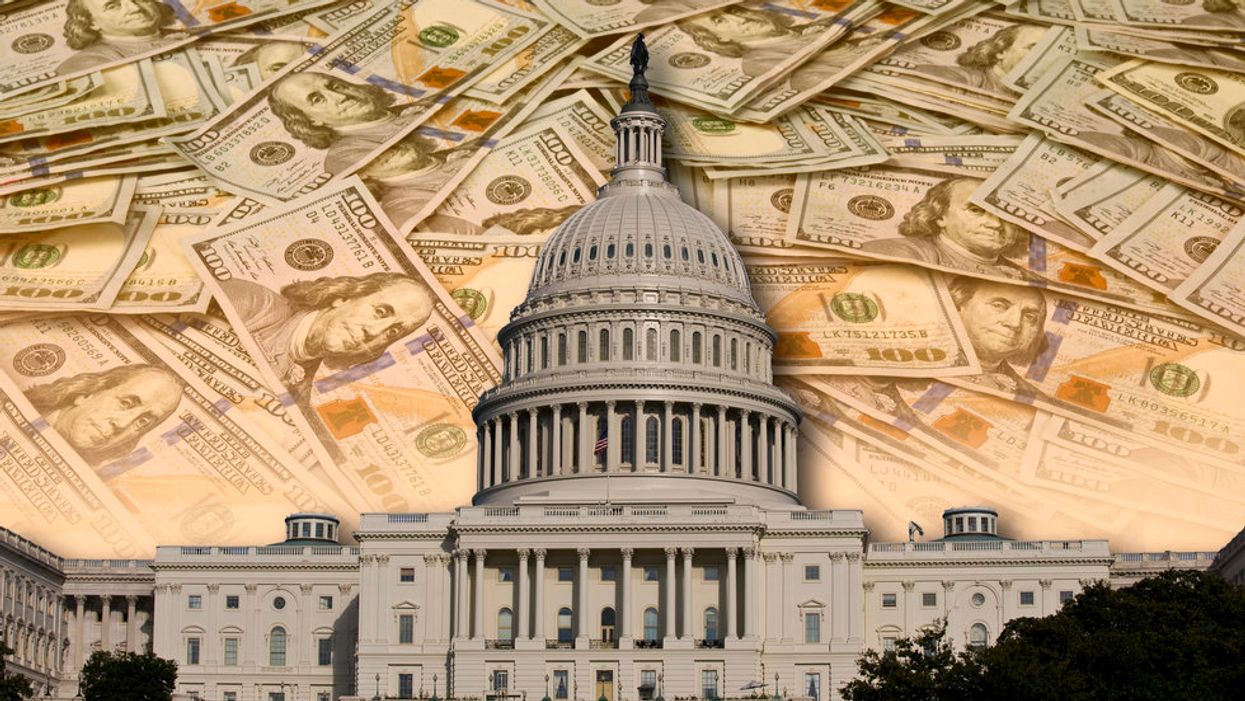Rubens was a Republican state senator in New Hampshire from 1994 to 1998. He's a board member of American Promise, which seeks to amend the Constitution to allow tighter controls on money in politics.
This month I shared the stage at American Promise's citizen leadership conference with Rep. Jamie Raskin, a liberal Democrat from Maryland. We differ on policy, but the two of us join most every American in agreeing on this deepest fundamental: Our government must be solely accountable to the governed — we, the American people.
To this end, to protect and preserve the world's oldest democratic republic, we will break the suffocating grip of concentrated big-money. We will get a 28th Amendment added to our cherished and ever-more-perfect Constitution.
Democrats are overwhelmingly on board. Two-thirds of Republican voters are on board. Now is the time to get Republicans in Congress to join us in large numbers. To do so we must persuade their most conservative constituents. And we can do that because big-money corruption is undermining three critical conservative priorities: capitalism, low taxes and federalism.
Our Founders unleashed capitalism — specifically, free-market capitalism — giving us greater wealth, progress and well-being worldwide than in all human history. But the current system of legalized political corruption has mutated free-market capitalism into crony capitalism.
Under crony capitalism, government picks economic winners and losers by doling out tax breaks, loan guarantees, regulatory favors and contract awards. Instead of delivering better products and services to customers, business competes by buying influence or submitting to de facto extortion in Washington.
The result? Innovation and new business formation have dropped to historic lows. Financial engineering is in. Capital investment and long-term research and development are out. Crony capitalism is why we have broadband and cellular dead zones, the world's highest drug prices, ethanol subsidies, too-big-to-fail banks and multibillion-dollar weapons systems that don't work.
It's why young and non-white voters — who will be the majority in a generation — now favor socialism over capitalism. The pay-to-play influence economy — not the Squad, not MSNBC — is the single most direct threat to free-market capitalism.
Now, conservatives come in several flavors, from small-l libertarians and social conservatives to right-populists and internationalists. We fight internally over abortion, trade, immigration and war. But one pillar of conservative thought connects all of us: keeping taxes low. And sustainably low taxes come from sustainably low spending.
Conservatives and progressives have both learned the hard way that big money does not really care about right-versus-left philosophy. Big money is united behind an endless push for more spending and tax loopholes for their favored programs.
And big money is driving big spending in a big way — because crony capitalism is so much more profitable than slugging it out in a competitive marketplace. A study by Open The Books published in Forbes magazine found that, for each dollar spent lobbying, the top 10 spenders got $1,000 in taxpayer-funded grants and contracts. A Sunlight Foundation study found something similar: For each dollar spent on lobbying and political contributions, politically active corporations received $760 in tax breaks, loan guarantees and contracts.
Pay-to-play corruption is why we're entering a time of trillion-dollar-a-year deficits. It's why Washington has recklessly loaded crushing debt service onto the backs of young people. It's why we've fattened special interests and starved spending on the infrastructure and blue-sky research that power long-term prosperity.
In the end, the bill will come due in the form of whopping tax increases. We can draw a straight line from the corrupt, big-money system to short-termism, twisted monetary policy, unsustainable spending commitments and punishing future tax increases.
To tackle this, conservatives want to amend the Constitution to mandate a balanced federal budget amendment; 28 of the necessary 38 states are on board for ratification. Conservatives need more blue states to get there. And we need red states at American Promise, where we count 20 states on board for amending the Constitution to allow more campaign finance regulation.
Our shared goals, ending high-tax fiscal insanity and big-money corruption, are joined at the hip. You can envision a beautiful red-blue reformers marriage.
In the past three years I've met with conservative state legislators from several states advocating support for a 28th Amendment. They are really angry at Tom Steyer, Michael Bloomberg, big unions and even fellow conservative Sheldon Adelson for pouring billions in from far away to buy elections. In swing presidential states, tight congressional races and even state legislative contests, a handful of billionaires from San Francisco, Manhattan and (probable) Saudi Arabia are tipping the scales.
When I ran for the Senate three years ago, total spending on the contest was $132 million — 95 percent of it from out of state. This is absolutely not what the Founders intended.
Because the hollowed-out media concentrate coverage on the candidates with the big money, the home-grown and locally funded candidates stay invisible. Voters are overwhelmed with a blizzard of ads paid for with "dark money" and filled with unrebutted lies. Debate is narrowed, voters get even more cynical and the issues get nationalized.
A conservative favorite from our Bill of Rights, the 10th Amendment reserves to the states and people all powers not expressly granted by the Constitution to the federal government. It guarantees respect for local preferences and political space to test and replicate successful policies. It makes the states our laboratories of democracy, and gives our form of government a unique structural advantage among nations. The corrupt, big-money system poses a direct threat to federalism, one of our strongest protections against the sort of tyranny that's spawned in the dark swamps of concentrated power.
In the end, conservatives in great numbers will join our movement because the pay-to-play, big-money system is killing free-market capitalism, exploding spending and debt and concentrating power in Washington. So those who want a 28th Amendment should have absolute confidence that Republicans have principled and powerful motivations to get aboard.



















